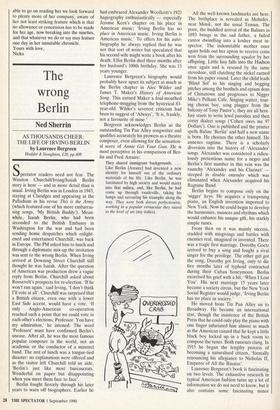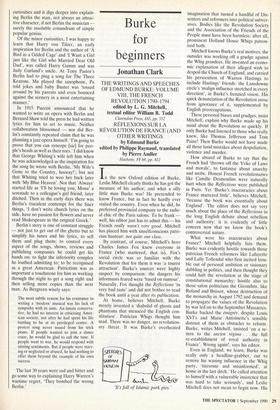The wrong Berlin
Ned Sherrin
AS THOUSANDS CHEER: THE LIFE OF IRVING BERLIN by Laurence Bergreen
Hodder & Stoughton, £20, pp.608
Spectator readers need not fear. The Winston Churchill/Irving/Isaiah Berlin story is here — and in more detail than is usual. Irving Berlin was in London in 1943, staying at Claridges and appearing at the Palladium in his revue This is the Army (which featured one of his more embarras- sing songs, 'My British Buddy'). Mean- while, Isaiah Berlin, who had been seconded to the British Embassy in Washington for the war and had been sending home despatches which enlight- ened and entertained Churchill, was back in Europe. The PM asked him to lunch and through a diplomatic mix-up the invitation was sent to the wrong Berlin. When Irving arrived at Downing Street Churchill still thought he was Isaiah. After the question of American war production drew a vague reply from Berlin, Churchill asked about Roosevelt's prospects for re-election. 'If he won't run again,' said Irving, 'I don't think I'll vote at all'. Churchill was surprised that a British citizen, even one with a lower East Side accent, would have a vote. 'If only Anglo-American co-operation reached such a point that we could vote in each other's elections, Professor. You have my admiration,' he intoned. The word 'Professor' must have confirmed Berlin's unease. After all, he was the most famous popular composer in the world, not an academic or the conductor of a minstrel band. The rest of lunch was a tongue-tied disaster: no explanations were offered and as the visitor left Churchill told an aide, 'Berlin's just like most bureaucrats. Wonderful on paper but disappointing when you meet them face to face'.
Berlin fought fiercely through his later years to warn off biographers. Earlier he
had embraced Alexander Woollcott's 1925 hagiography enthusiastically — especially Jerome Kern's chapter on his place in American music; 'Irving Berlin has no place in American music. Irving Berlin is American music.' To offers for his auto- biography he always replied that he was not that sort of writer but speculated that his second wife might write a book after his death. Ellin Berlin died three months after her husband's 100th birthday. She was 15 years younger.
Laurence Bergreen's biography would probably have upset its subject as much as the Berlin chapter in Alec Wilder and James T. Maker's History of American Song. This earned Maker a foul-mouthed telephone-mugging from the hysterical 83- year-old. Wilder's severest criticism had been to suggest of 'Always', 'It is, frankly, not a favourite of mine.'
Bergreen acknowledges Berlin as the outstanding Tin Pan Alley songwriter and qualifies accurately his prowess as a theatre composer, even allowing for the sensation- al score of Annie Get Your Gun. He is most perceptive in his comparison of Ber- lin and Fred Astaire: They shared immigrant backgrounds. . . . Like Berlin [Astaire] had invented a new identity for himself out of the ordinary materials of his life. Like Berlin, he was fascinated by high society and would marry into that milieu, and, like Berlin, he had come up through vaudeville, taking his lumps and savouring his triumphs along the way. They were both driven perfectionists, working in a popular vernacular they raised to the level of art (my italics). All the well-known landmarks are here. The birthplace is revealed as Mohidev. near Minsk, not the usual Temun. The poor, the huddled arrival of the Balines in 1893 brings in the sad father, a failed cantor dwindling into a kosher meat in- spector. The indomitable mother once again holds out her apron to receive coins won from the surrounding squalor by her offspring. Little Issy falls into the Hudson once again and is rescued by the same stevedore, still clutching the nickel earned from his paper round. Later the child leads 'Blind Sol' to his singing and begging pitches among the brothels and opium dens of Chinatown and progresses to Nigger Mike's Pelham Cafe. Singing waiter, tour- ing chorus boy, song plugger from the balcony of Tony Pastor's, they are all here. Issy starts to write lewd parodies and then corny dialect songs ('Cohen owes me 97 Dollars'). One is published and the printer spells Baline 'Berlin' and half a new name is born. He chooses the other himself. He annexes ragtime. There is a scholarly diversion into the history of 'Alexander' songs. Alexander was considered a ridicu- lously pretentious name for a negro and Berlin's first number in this vein was the raunchy 'Alexander and his Clarinet' steeped in double entendre which was eliminated when Alexander acquired his Ragtime Band.
Berlin begins to compose only on the 'nigger' keys. He acquires a transposing piano, an English invention imported to New York. Now he could begin to develop the harmonies, nuances and rhythms which would enhance his unique gift, his starkly simple tunes.
From then on it was mainly success, studded with misgivings and battles with enemies real, imagined or invented. There was a tragic first marriage. Dorothy Goetz arrived to buy a song and fought a rival singer for the privilege. The other girl got the song, Dorothy got Irving, only to die five months later of typhoid contracted during their Cuban honeymoon. Berlin exorcised his grief with a hit, 'When I Lost You'. His next marriage 15 years later became a society circus, but the New York Social Register would judge, 'Irving Berlin has no place in society.'
He moved from Tin Pan Alley on to Broadway. He became an international star, though the insistence of the British Press that he could only play the piano with one finger infuriated him almost as much as the American canard that he kept a little black boy locked up in a back room to compose the tunes. Both rumours clung. In 1915 he began the lengthy process of becoming a naturalised citizen, 'formally renouncing his allegiance to Nicholas II, Emperor of All the Russias'.
Laurence Bergreen's book is fascinating on two levels. The exhaustive research in typical American fashion turns up a lot of information we do not need to know, but it also contains some fascinating minor curiosities and it digs deeper into explain- ing Berlin the man, not always an attrac- tive character, if not Berlin the musician surely the insoluble conundrum of simple popular genius.
Of the minor curiosities, I was happy to learn that Harry von Tilzer, an early inspiration for Berlin and the author of 'A Bird in a Gilded Cage' and 'I Want a Girl just like the Girl who Married Dear Old Dad', was called Harry Gumm and was Judy Garland's uncle. At Tony Pastor's Berlin had to plug a song for The Three Keatons. Ma played the saxophone, Pa told jokes and baby Buster was 'tossed around by his parents and even bounced against the scenery in a most entertaining manner.'
In 1915 Puccini announced that he wanted to write an opera with Berlin and Bernard Shaw told the press he had written lyrics for him to set to music. Neither collaboration blossomed — nor did Ber- lin's constantly repeated claim that he was planning a jazz opera himself. `I'm going to prove that you can syncope [sic] for peo- ple's heads as well as their toes.' I did know that George Whiting's wife left him when he was acknowledged as the inspiration for the song he wrote with Berlin, 'My Wife's Gone to the Country, hooray!'; but not that Whiting tried to woo her back later with 'My Blue Heaven'. Nor that 'Always' started life as 'I'll be loving you, Mona' a serenade to a colleague's girl friend, later ditched. Then in the early days there was Berlin's truculent contempt for the finer things, 'I don't write church lyrics on the side, have no passion for flowers and never read Shakespeare in the original Greek.'
Berlin's story is one of constant struggle — not just to get out of the ghetto but to simplify his tunes and his lyrics, to sell them and plug them; to control every aspect of the songs, shows, reviews and publishing companies he could get his hands on: to fight the inferiority complex he loathed admitting to; to be recognised as a great American. Patriotism was as important a touchstone for him as working through the night to get a song right and then selling more copies than the next man. As Bergreen wisely says:
The most subtle reason for his resistance to writing a 'modern' musical was his lack of sympathy with its aims. An innate conserva- tive, he had no interest in criticising Amer- ican society, not after he had spent his life battling to be at its privileged centre. A protest song never issued from his trick piano. If people wanted to join a dance craze, he would be glad to call the tune. If people went to war, he would respond with stirring sentiments. But if people were starv- ing or neglected or abused, he had nothing to offer them beyond the example of his own success.
The last 30 years were sad and bitter and go some way to explaining Harry Warren's wartime regret, 'They bombed the wrong Berlin.'



















































 Previous page
Previous page